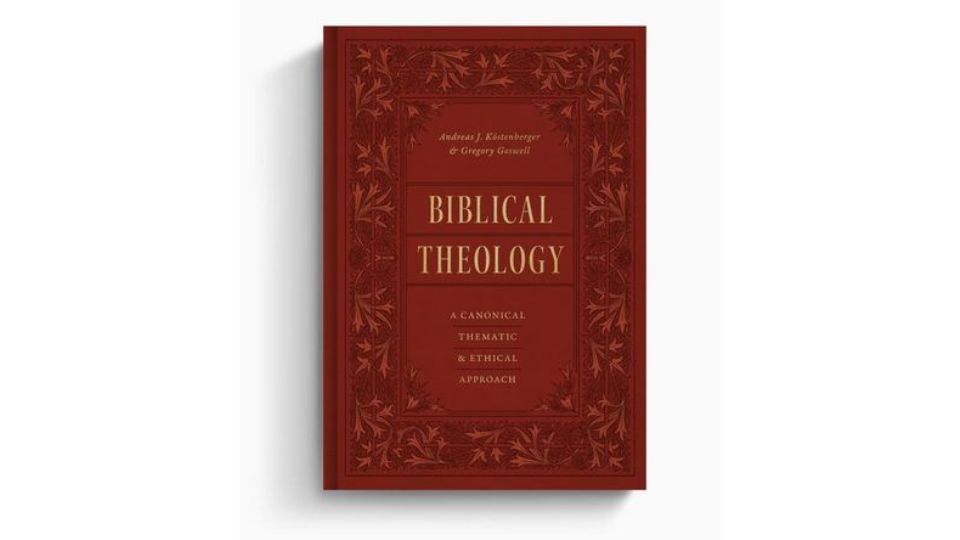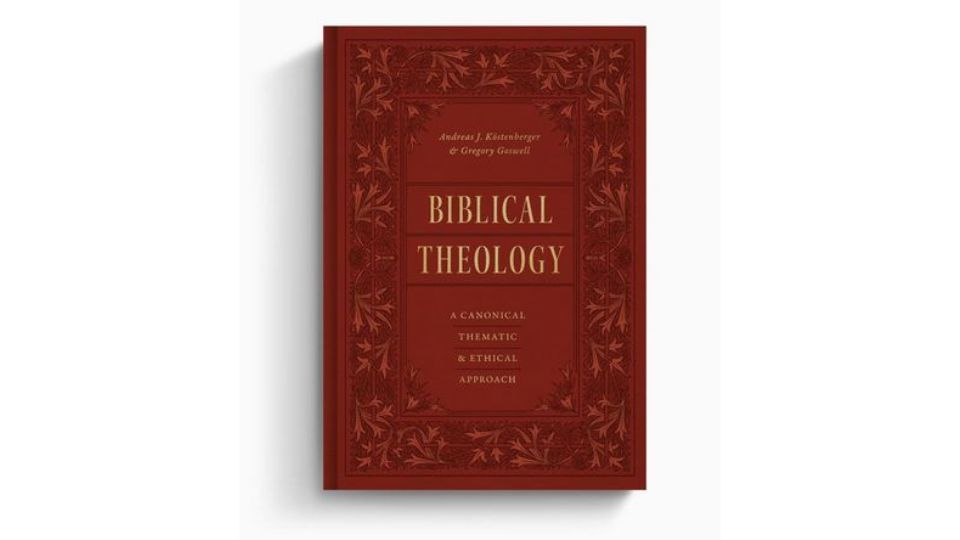Biblical Theology: A Canonical, Thematic, and Ethical Approach
This book by Kostenberger and Goswell is an excellent one-volume reference on the biblical theology of each of the 66 books of the Bible.

Biblical Theology is a 1016 page book written by Andreas J. Kostenberger and Gregory Goswell and published by Crossway in 2023.
Kostenberger completed a Master of Divinity at Columbia Bible College and Graduate School of Missions (1988) and a Ph.D. at Trinity Evangelical Divinity School (1993).
Goswell is the Academic Dean and a lecturer in Old Testament at Christ College, and he is also the Chair of the Australian College of Theology (ACT) Research and Research Studies Committee and a member of the ACT Academic Board..
1. Purpose of Biblical Theology
The authors have written this volume on biblical theology to summarize the themes and "the theology of [each of the 66 books of the Bible], as well as its ethic and place in the storyline of Scripture. Their aim is also "to blend a book-by-book readin gwith both a central-themes and a metanarrative approach.
2. Content of Biblical Theology
The opening chapter (66 pages) sets the foundation for the rest of the book. The authors define biblical theology as "the theology of the Bible...not our own theology, or that of our church or denomination; it is the theology of the biblical writers themselves. The authors distinguish biblical theology from (a) systematic theology, (b) the "theological interpretation of Scripture," and (c) hermeneutics. They cover the practice and methods of biblical theology and the significance of biblical book order and ethics.
The next 280 pages are devoted to the Old Testament. A brief discussion on the Hebrew canon (Torah, Prophets, and Writings) and Greek OT canon (Pentateuch, Historical Books, Poetic Books, and Prophetic Books) is covered before a survey of the theology of each of the 39 Old Testament books. The Pentateuch is taken as one unit followed by the Former Prophets (Joshua, Judges, Samuel, Kings), the Later Prophets (Isaiah, Jeremiah, Ezekiel, the Book of the Twelve), and the Writings (Psalms, Job, Proverbs, and the Megillot[^1]).
340 pages and then devoted to the New Testament. The canonical order of the New Testament is covered as well as a discussion on the relationship between the two Testaments and the New Testament Use of the Old Testament. The New Testament is then covered book by book. The discussion is separated as follows: the Gospels, the Book of Acts, the Letters of Paul, the General Epistles, and the Apocalypse.
The final 80 pages glosses over the larger biblical themes, ethics, and storyline of the Old and New Testament and the entire Bible as a unit.
3. Commentary of Biblical Theology
The opening chapter is a comprehensive, up-to-date overview of the history, practice, and methods of biblical theology. It serves admirably as a terrific overview for any pastor, seminarian, or serious Bible student.
The author's method of organization of this biblical theology is novel, logical, and effective. Each book discussion is divided into three sections: themes, ethics, and storyline.
As an example, for the book of Genesis, the authors state the central themes of Genesis are the Abrahamic promises (land, blessing, and offspring), covenant, and God's salvation that aims to repair the created order. Some ethics of the book are then identified including the command "to be fruitful and multiply," the original design of monogamy, and the design to live at peace with surrounding people groups. Finally, the storyline of Genesis is discussed and its fit within the entire storyline of Scripture.
The main content of the book, a discussion of the theology of each individual book, is thoughtful and well researched. The footnotes and bibliography are extensive and helpful for readers who want suggestions for further study. One may quibble with which themes are overemphasized or neglect, but the ambitious coverage of every book is overall successful.
Few will likely read this book from cover to cover. Most will likely benefit from reading Chapter 1 (Introduction), Chapter 2 (Old Testament Framework), Chapter 7 (Relationship Between the Testaments), and Chapter 13 (Conclusion). Then the reader may choose sections of the book to the portions of Scripture he is currently studying.
4. Comparison Analysis
Because the authors are focused on using the limited space of this book for biblical theology, there is not much effort devoted to Bible introduction. This book's focus is to serve as a biblical theology of each of the 66 books of the Bible.
I would actually steer many non-academic Christians away from this book. Many Christians will be better served by simply using a good study Bible as their initial guide to their Bible reading and Bible study. And if you want more introductory material, a Bible handbook like the MacArthur Bible Handbook is more practical and helpful.
Another alternative to this book is the two volume set that serves both as a Bible survey and a basic biblical theology.
- What the Old Testament Authors Really Cared About: A Survey of Jesus' Bible
- What the New Testament Authors Really Cared About: A Survey of Their Writings
5. Final Thoughts on Biblical Theology
For Christians who are not interested in a denser academic presentation of biblical theology, there are better companions to Bible reading and Bible study like a good Bible handbook or a good Bible survey that focuses on biblical theology and the storyline of the entire Bible.
But for pastors, seminarians, and serious Bible students who want a one-volume reference on the biblical theology of each of the 66 books of the Bible, this biblical theology by Kostenberger and Goswell comes highly recommended.

Biblical Theology: A Canonical, Thematic, and Ethical Approach
by A. Kostenberger and G. Goswell | Crossway (2023)




